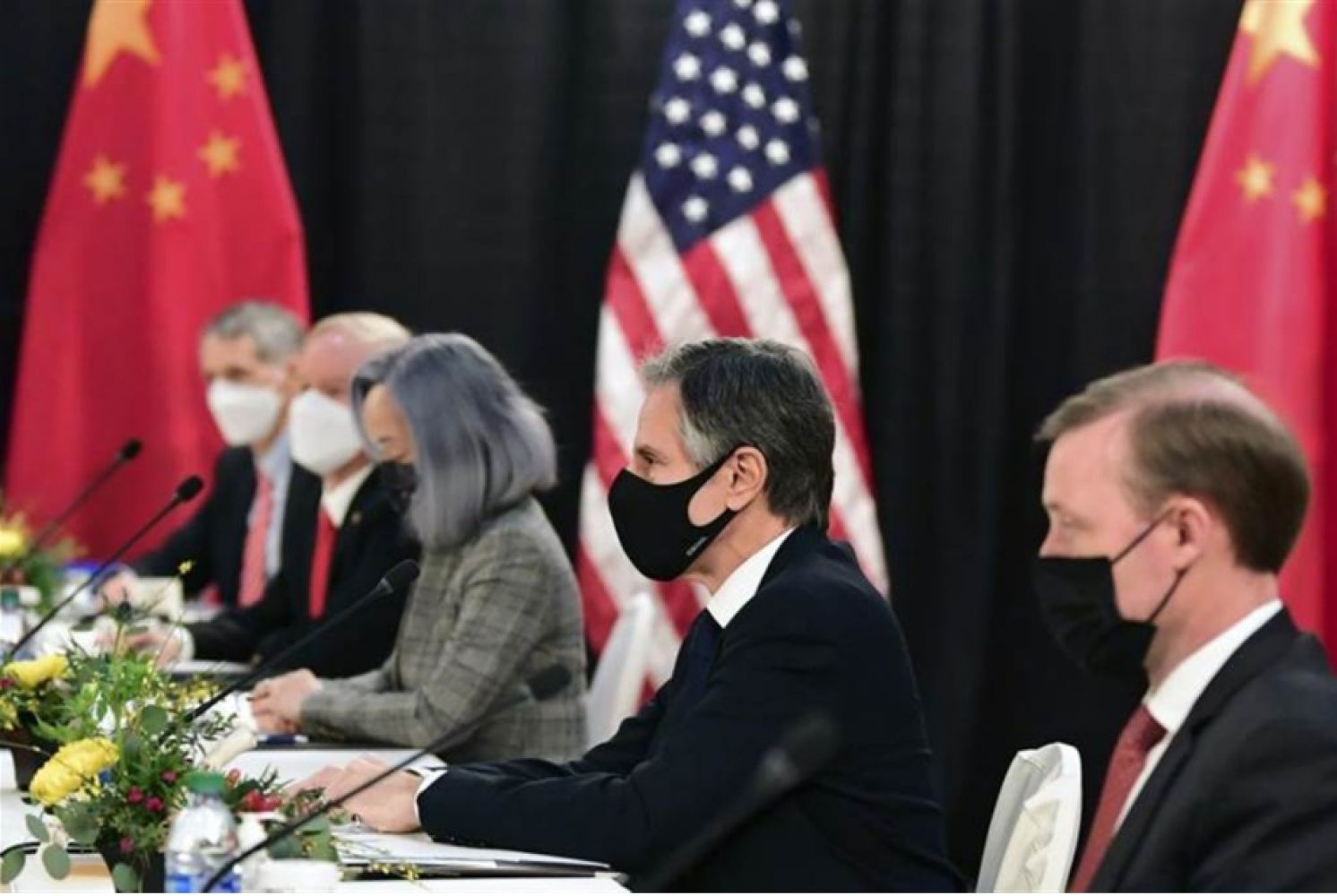
The United States and China Clash
By Chen I-hsin
China Times, March 19, 2021
The much anticipated first-round high-level meeting of foreign affairs and national security senior officials between the United States and China since tine inauguration of President Joe Biden took place March 18 in Anchorage, Alaska. Even though diplomatic delegations from both sides had maintained that they did not have high hopes for the meeting, it still came as a surprise when both sides traded barbs in the opening statements before the closed-door session, regardless of meeting norms or diplomatic etiquette.
In the so-called 2-plus-2 meeting, the American delegation was headed by Secretary of State Anthony Blinken and National Security Advisor Jake Sullivan, while the Chinese delegation was headed by Director Yang Jiechi of the Central Foreign Affairs Commission Office of the Chinese Communist Party and Minister of Foreign Affairs Wang Yi. The agreement for the opening remarks was two to four minutes for each of the four senior officials. However, Secretary Blinken took the opportunity to criticize China for threatening the rules-based order that maintains global stability and raised concerns over human rights violations against the Uighur population in the province of Xinjiang, in addition to trampling on Hong Kong’s autonomy and Taiwan’s democracy. In his remarks, Sullivan mentioned that the United States does not seek conflict, but welcomes stiff competition and will always stand up for principles.
Blinken and Sullivan together spoke for 10 minutes, slightly overtime, in their opening statements, Yang Jiechi grabbed the opportunity to speak over 18 minutes, rebuking the United States for condescension and being unqualified to represent the world. Yang even used the Black Lives Matters as an example to criticize America’s human rights condition and advise the United States to handle its domestic affairs. Yang then reaffirmed that Taiwan, Hong Kong and Xinjiang are inalienable parts of China’s territory and no foreign interference will be tolerated. In his remarks, Wang also criticized the United States for exercising long-arm jurisdiction and said this old habit should be corrected.
Yang, known for his soft-spoken manner, suddenly became a belligerent wolf warrior. Blinken, probably agitated by Yang, decided to make extra comments. He asked the reporters who supposed to be leaving to stay on to record the American response. Blinken admitted that the United States is not perfect and did make mistakes, yet America has taken steps back openly and transparently, instead of trying to pretend they don’t exist or to sweep them under a rug. Blinken concluded his remarks by saying “it’s never a good bet to bet against America, and it’s true today.”
After finishing his remarks, Blinken gave order to clear the room for the closed-door meeting, not giving the Chinese delegation more time to speak. The Chinese delegation startled and wondered it was the American way of diplomacy. Apparently the United States chose Alaska to be the meeting venue in order to enjoy the home-court advantage.
According to media reports, the atmosphere of the closed-door meeting remained sour. Although the discussions touched on issues including climate change, coronavirus pandemic, nuclear proliferation and denuclearization of the Korean peninsula, neither the American nor Chinese officials, got fully over their bitterness and continued to confront each other in their verbal exchanges. In diplomatic terms, candid discussion means each side gives its opinions, but finds no mutual connection.
Due to the coronavirus (COVID-19) pandemic, both sides had agreed not to have dinner together. However, it turned out that even private chat and evening meeting were also cancelled. Immediately after the closed-door meeting, the Chinese delegation rushed out through the door and jumped into their limo to go back to the hotel. It was a rare scene in any U.S.-China talks.
Prior to the meeting, President Biden participated in the virtual Quadrilateral Security Dialogue, later the United States also took part in the U.S.-Japan 2+2 meeting and the U.S.-South Korea 2+2 meeting. The United States seemed to be preparing for the U.S.-China Anchorage meeting. Judging from Blinken and Sullivan’s comments that both countries should cooperate according to the American way, and the United States welcomes competition or even confrontation, the hardline position of the Biden administration gradually emerged.
For the Chinese side, judging from the comments made by Yang and Wang which asked the United States to stop meddling in Taiwan, Hong Kong and Xinjiang affairs, in addition to the statement made by Chinese ambassador to the United States, Cui Tiankai, that there is no room for compromise over issues concerning Chinese sovereignty, it is clear that China will not swerve from safeguarding its core interests. Yang even publicly stated that "the United States does not have the qualification to say that it wants to speak to China from a position of strength." Since the United States and China both stick to their positions which reflected in the heated debate in the meetings, it was nearly impossible to produce any real progress on substantive issues.
The reason why the Anchorage meeting was tense is mainly because the atmosphere before the meeting was not ideal. The United States kept pushing diplomatically and left no room for both sides to compromise. Both sides had prepared negotiation scenarios and conducted the meeting as rehearsed. However, both delegations got so stuck into their roles and turned a meeting to exchange ideas into a meeting of public theatrics and dramatics over substance. The meeting is destined to become one of the U.S.-China negotiations that one side can blame the other side for its failure.
It is too early to conclude that the U.S.-China relations has reached a point of no return. As Blinken pointed out, there will be no follow-up high-level meeting after this one, yet if progressive steps are taken, the United States won’t rule out another bilateral dialogue. The future of the U.S.-China relations remains to be seen.
From: https://www.chinatimes.com/opinion/20210319004646-262105?chdtv